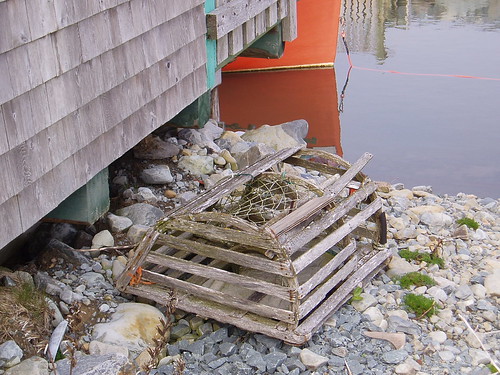Well… Doug Belshaw through my name on his list of people he would like to have answer ‘the book meme.’ It’s now 6:08 here on the East Coast, and i thought i might do a little book history on myself. Funny, I had my students do this for themselves this spring, and now realize that i never did one myself. This is mostly going to be stream of consciousness, and probably not terribly compelling reading for most of you… but… hey. I like navel gazing. 🙂
1) One book that changed your life?
Steppenwolf – I come from a very small town in Northern New Brunswick. My parents are wonderful, pragmatic people. Acadians who broke molds in their society – my mother was my baseball and hockey coach, my father… well… lets just say that the one motto that I’ve stopped having to repeat to myself, that i learned from him is simple – If it can be done, i can do it. I took this pragmatism to university with me and started in Computer science (programming). I hated it. There was a point in my second year of university where i read this book, cover to cover, twice. Haller’s fate, of the tortured writer yearning for a cut off point for his life, was one that in the mellodrama of a 19 year old, was very present indeed. My writing was supposed to be the outlet for that confused time in my life, to balance off the pragmatic work that i was trying to force myself to like. That was a strange, transitional year, and this book probably takes a chunck of credit for moving me out of the cold science of programming (as it was being presented to me) and on towards philosophy.
2) One book you have read more than once?
Ha. I have a bit of a book rereading problem so this is gonna be a bit of a toss up. By shear volume, i suppose LOTR is the book I’ve read many more times than once. One book i find myself going back to just to get my mind around what it might mean is John Keegan’s ‘History of Warfare‘. There’s some link between the evolution of war and the evolution of education (of society as a whole) that i’m still trying to come to terms with. Just for fun, I’ll throw a phil book in too… The blue and brown books. Wittgenstein is the most… useful philosopher on my shelf.
3) One book you would want on a desert island?
Maybe this one? If it has to be one that’s already on my shelf… Millman’s Gibbon’s Rome, Decline and Fall of the Roman Empire. i particularly like Millman’s edition, as he is quite stodgy about Gibbon’s fantastic sense of humour.
4) One book that made you laugh?
The one book that can make me laugh when i pick it up, at any point in the book, at any time is Dirk Gently’s Holistic Detective Agency. Douglas Adams is one of my heroes. Here’s a guy who put his hand to everything, wrote some very entertaining and philosophically interesting books… and was a real lover of his fellow person. His is the kind of soul that makes you wish for an afterlife.
5) One book that made you cry?
Log from the Sea of Cortez this book starts with a 50 dedication to a close friend. Some of the best writing of the twentieth century IMHO. For fun, I’ll throw in another Steinbeck. East of Eden.
6) One book you wish had been written?
I’d go in for a little “Lets Go’s guide to the ancient world copyright 500 AF (after flood)”.
Ack! edit. I read this as “you wish you had written”. Here’s the old text for that.
Ha. Any book would do. 🙂 I actually did write one i suppose, but it was never released. (fortunately, in retrospect it was pretty… um… come to think of it, like this. navel gazing) Foucault’s Pendulum. That would make me Umberto Eco. And that’s cool. And it would mean that i actually understood all the stuff in that book, which i clearly don’t. Still… a fantastic novel. If you’re not familiar with it… it deals with the same material as the Davinci code, except, if it was turned into a film, it would look more like Nouvelle Vague.
7) One book you wish had never been written?
I’ll let aside the freedom of speech, all texts are good texts argument and play along with this one. I’m gonna go out on a limb and say Plato’s Republic. That book has been the cause of alot of bad government, his ideas of ‘governance by the philosopher king’ sounds nice (maybe) but in practice, everyone always thinks that THEY are the people who should be ‘taking care of everyone else’. Plato also, if i remember correctly, believed that plays etc… should be banned as they only stir up unrest and don’t support the bettermeant of the state. I should add… assuming anyone has gotten this far in this post, that the Socratic Plato is some of my favorite reading.
8) One book you are currently reading?
The one, the only, the incredibly long, fantastically well written (maybe TOO well written, ‘In Search of Lost Time’. (Otherwise known as the Remembrance of things past) I love the novel, but get so caught up in the descriptions i spend more time rereading than I do finishing it. If you’re not familiar with it, read through some of those amazon reviews… no need for me to gush.
9) One book you have been meaning to read?
Too much stuff to catelog. Let’s say Ulysses, Deleuze and that damn friedman book that i feel like i know cover to cover but have not read.
10) Now tag five people.
Again, too many people to name. I’ll say bonnie stewart, by partner and best pal. Let’s try , Josie Fraser, bud hunt, Michael Feldstein and Leigh Blackall. There are bunches more, but some, like Barbara Ganley have been picked already :(. cheerio.
 1. I was brought up as a lobster fisherman (among other things). Through the different lives I’ve had the pleasure of living there’s been this thread, both the real and the imagined, of the crack of an outboard motor at 5 o’clock in the morning, the feeling of a crab trying to clamp down on my wet, plastic gloved fingers and the fingernail sunrise. I miss the life I’ll never have on the water… probably far more than I would have enjoyed the real life that could have been.
1. I was brought up as a lobster fisherman (among other things). Through the different lives I’ve had the pleasure of living there’s been this thread, both the real and the imagined, of the crack of an outboard motor at 5 o’clock in the morning, the feeling of a crab trying to clamp down on my wet, plastic gloved fingers and the fingernail sunrise. I miss the life I’ll never have on the water… probably far more than I would have enjoyed the real life that could have been.